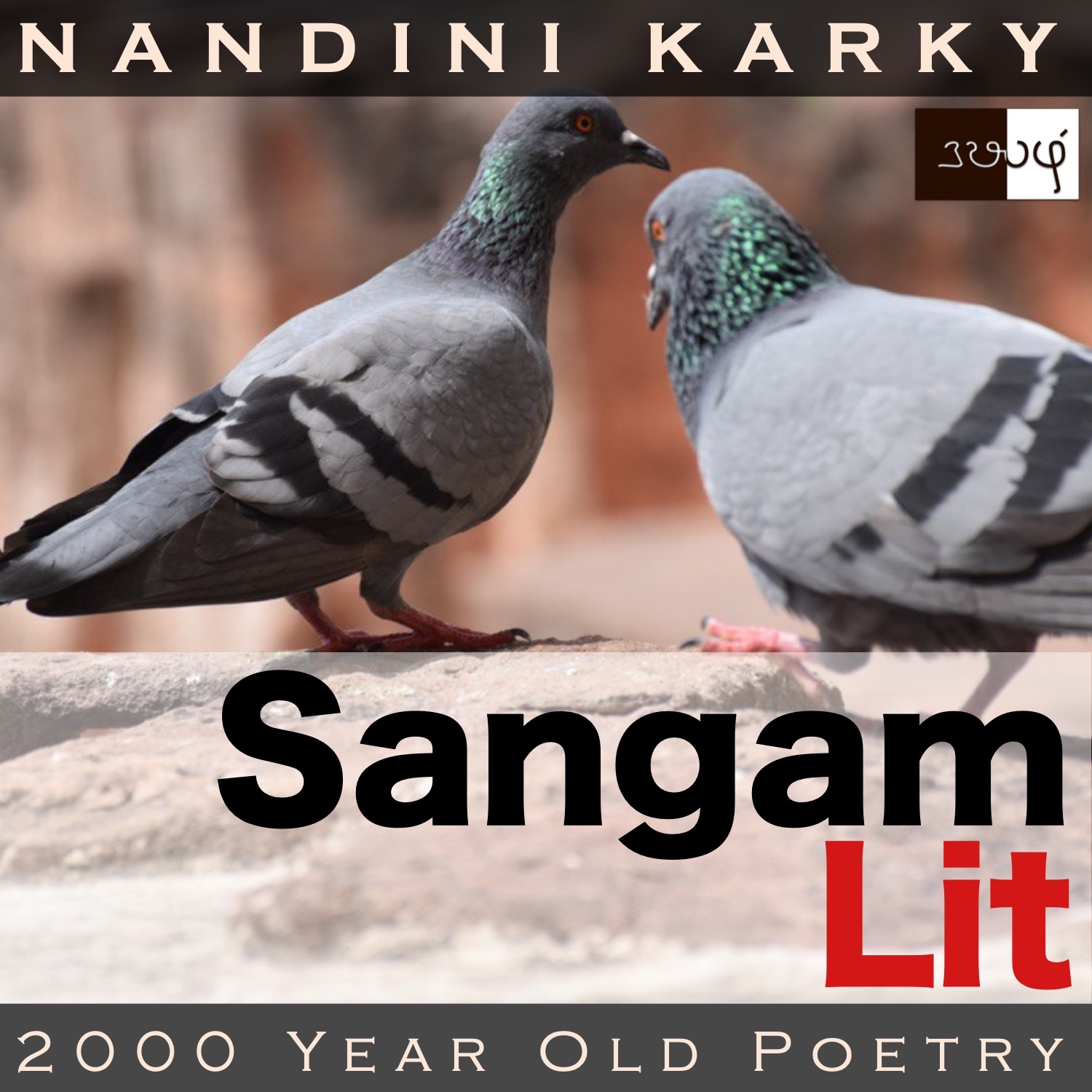Podcast: Play in new window | Download
Subscribe: Apple Podcasts | Spotify | Amazon Music | Android | iHeartRadio | TuneIn | RSS | More

In this episode, we listen to the ecstatic words of a man, whose dream has been fulfilled, as depicted in Sangam Literary work, Natrinai 384, penned by Paalai Paadiya Perungkadungko. The verse is situated in the drylands of ‘Paalai’ and speaks in the voice of the man to his heart, observing the lady walking ahead, as they elope away to the man’s town.
பைம் புறப் புறவின் செங் காற் சேவல்
களரி ஓங்கிய கவை முடக் கள்ளி
முளரி அம் குடம்பை ஈன்று, இளைப்பட்ட
உயவு நடைப் பேடை உணீஇய, மன்னர்
முனை கவர் முது பாழ் உகு நெற் பெறூஉம்
அரண் இல் சேய் நாட்டு அதர் இடை, மலர்ந்த
நல் நாள் வேங்கைப் பொன் மருள் புதுப் பூப்
பரந்தன நடக்க, யாம் கண்டனம் மாதோ:
காண் இனி வாழி-என் நெஞ்சே!-நாண் விட்டு
அருந் துயர் உழந்த காலை
மருந்து எனப்படூஉம் மடவோளையே.
Opening with ‘பைம் புறப் புறவின் செங் காற் சேவல்’ meaning ‘the male pigeon with crimson legs and beautiful feathers on its back’, the verse performs the work of an artist. Being an arid region, the plant life we get to meet is as expected, ‘a cactus with curving branches’, as seen in the words ‘முடக் கள்ளி’. The words ‘குடம்பை ஈன்று’ meaning ‘giving birth in a nest’ and ‘உயவு நடைப் பேடை’ meaning ‘the mate with a slowed walk’ makes us empathise with the fatigue of this bird mother. The phrase ‘மன்னர் முனை கவர் முது பாழ் உகு நெல்’ is an action-filled one detailing the past and present of a place in concise terms, about which we will explore shortly. ‘நல் நாள் வேங்கைப் பொன் மருள் புதுப் பூ’ talks about the ‘golden-hued new flowers of the auspicious Indian Kino tree’, auspicious because the blooming of these flowers announced to these ancients that it was both time for harvest and for marriage. The verse ends with ‘மருந்து எனப்படூஉம் மடவோளையே’ meaning ‘the naive, young maiden, who is the only cure’ and makes us smile at this jubilant declaration of love!
The man and lady had been leading a love relationship and had been trysting for a while. As the man was preparing to seek the lady’s hand in marriage, he learns that the lady’s parents were thinking of giving their daughter in marriage to a stranger. Realising the only way to preserve their love was to elope away, the man seeks and wins the help of the lady’s confidante, who persuades the lady to leave with the man. As they journey on through the drylands, the man says to his heart, “For its hungry mate with a slackened gait, which had laid eggs in their nest made of twigs on the fork of a curved cactus that abounds in that salty land, the red-legged male of a pigeon with a beauteous back brings scattered paddy grains from a place, deserted long ago, owing to a king’s war that unfolded there. On such an unprotected drylands path in a faraway land, as the full-bloomed, auspicious, gold-like, fresh flowers of the ‘vengai’ lie spread out, she walks and I get to see this! O heart, may you live long, relish the sight of this naive, young girl, who had once made me suffer so deeply, making me forget all sense of shame; And yet, she was the only cure!” With these words, the man celebrates the feeling of walking with his love, whom he has gained after a long struggle.
Now, for the nuances! The man turns his eyes towards a nest he finds on the drylands path. There he sees a female pigeon, looking tired and unable to venture out, as she had to keep her young eggs warm. Perceiving the hunger of its mate, the male pigeon looks out for food and finds grains scattered about in a place. Grains are the product of hard work and no ancient farmer would leave it to ruin without a valid reason! As surmised, the reason happens to be that it was the very place where a king had waged war. This makes us imagine how the people, knowing of the imminent danger, would have run away helter-skelter, their valued possessions abandoned, fearing the safety of their lives. Something that goes on to show that only peace can lead to prosperity as well as the proper use of resources. Returning to the verse, this is why the male pigeon finds what it’s looking for – food for its mate. The man observes the male pigeon bringing these grains and feeding its fatigued female. He mentions this scene as if to describe the harsh path the man and lady are walking on, just then!
Even though the path is harsh, the man brings to fore, the radiant blooms of the ‘vengai’ tree that seem to be scattered about everywhere. It’s on these golden flowers, the lady is taking one step after the other and he simply delights in that sight. He invites his heart, as if it were a separate entity, to partake in this joy. At the same time, he looks back to a time, when he wallowed in pain, being unable to near this very girl. Yet, he knew well, then and now, that she was the both the reason for the suffering as well as its only cure. The poem brims with the duty and beauty of love, be it in the male pigeon’s determination to slay its mate’s hunger or the man’s celebration for receiving the gift he had yearned for – that joy of being with a beloved!




💛💛